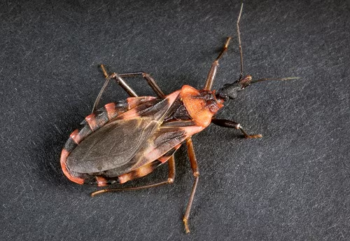Vaccines are recommended for babies, teens and adults, but have you ever wondered where those recommendations come from?
It’s the Advisory Committee on Immunization Practices, a panel of 15 immunization experts from across the country.
Dr. Mark Sawyer, Medical Director of the San Diego Immunization Partnership, a UCSD contract with the County Health and Human Services Agency, is on the panel. He sat down with County News Center to talk about the role of the Advisory Committee, also known as ACIP. (Answers have been edited for brevity.)
1. Why did the Committee decide to recommend the pertussis (whooping cough) vaccine for all adults?
There was a previous recommendation that all adults up to age 64 should be vaccinated against pertussis. The recent decision was partly prompted by the fact that one of the available vaccines was licensed by the Food and Drug Administration for use in adults 65 years of age and above and because of previous studies showing that grandparents are at times responsible for transmitting pertussis to babies.
2. Was the main reason to protect infants? What is the goal?
The most important goal is to protect infants because seniors can transmit pertussis to them. But it’s also to protect the seniors because they do get pertussis and occasionally they get sick enough to be hospitalized.
3. What is the role of the Advisory Committee and how long have you been a member of it?
I have been on it for almost four years now. The Committee is responsible for making recommendations on the use of vaccines in the United States for the entire civilian population. The Committee is made up of 15 voting members.
4. Do you always agree?
In general, we do form a consensus and the reason is the amount of background work that goes into potential recommendations is very extensive. By the time the Committee is considering something for a formal adoption, it has been very thoroughly researched and the entire data has been reviewed. Most people come to the same opinion about what should happen, either to use it or not use it. People may not realize but we don’t recommend every vaccine that is licensed and available for use. Sometimes we leave it for individual physicians to decide if their particular patient needs to have that vaccine as opposed to making a general recommendation that everybody gets a certain vaccine.
5. How important are vaccines?
Vaccines are the most important health intervention we have. Number one, they are preventative. It’s much better to prevent disease than treat it. Number two, they are very effective, much more effective than almost anything else we do in medicine and they are very cost-effective. Vaccines are one of the top public health interventions of the 20th century.
6. Vaccines are considered the single most life-saving accomplishment of the 20th Century, yet some parents have concerns about vaccines. Why do you think that is?
There are a lot of factors that have led to some parents questioning the need for vaccines and the safety of vaccines.
The first is that since vaccines have eliminated so many diseases, many young parents have never seen them or they have lost fear of what the disease can do. As an infectious disease physician, which is what I do the rest of the time, I still see them all the time. For me, I am reminded everyday about the benefit of vaccines because I see what happens when people are not protected.
The other major contributor to this phenomenon in the last decade is the free flow of information, via the internet. That is a good thing, except the information is unfiltered and there is lots of incorrect information – misleading information that one can find on the internet. My concern for parents that ultimately decide not to immunize their children is that they are making that decision based on bad information.
7. Are vaccines safe?
Vaccines are very safe. Compared to essentially everything else we do in medicine, vaccines are the safest thing we have. You have to realize that most vaccines are given to everyone in the country, so millions and millions of doses vaccines are given, unlike a medicine or a procedure, which are given to a much smaller number of people. Also, the rate of severe side effects from vaccines is exceedingly low.
8. Another concern from parents is whether vaccines cause autism.
This question has been in people’s minds for more than a decade. From the scientific point of view, it has been completely answered and the answer is that vaccines do not cause autism. There have been dozens of scientific studies that show that.
It’s a coincidence that the age when autism first presents itself and the age of when children get a lot of vaccines is the same age; young children one to two years of age. It’s natural for people to associate those two things. And the only way to prove that vaccines do not cause autism is with scientific studies, which have now been done and have shown there is no link.
9. Does the Committee take into account parents concerns over vaccines?
Absolutely. I would say vaccine safety has been elevated because of the concerns from some members in the community. We realize we have a responsibility to be completely transparent about any vaccine safety issue and to thoroughly review vaccine safety before we make a recommendation for a vaccine to be used generally and to support the on-going studies that look at vaccine safety even after a vaccine is used. The government has really strengthened our ability to study vaccine safety to the point that I can comfortably say vaccines are the safest thing we use in medicine.
10. Parents have also shown some concerns Human Papillomavirus (HPV) vaccine for girls and more recently for boys?
It’s a vaccine that can prevent cancer. That is something that we have been waiting for and certainly hope that other vaccines are developed that can prevent cancer. It prevents cancers that are quite common in both girls and boys. The people who wonder why we recommended it for boys don’t appreciate that the number of cancers caused by HPV in boys is about half as much as it is in girls. It’s not a rare thing. There are around 7,000 cases of cancers each year that are caused by HPV. And this vaccine can prevent the majority of those.
11. If young people are already sexually active, should they still get the HPV vaccine?
Yes, you should because there are multiple types of HPV and even though you may have already been infected with one, you may not have been infected with all of them and the vaccine can still help you.
12. Finally, what are some of the myths about vaccines?
After the autism one, which continues to be number one on the David Letterman Top Ten, the next one we hear the most is that vaccines overwhelm the immune system. People have raised that concern because we now give many more vaccines than we used to. Some people don’t understand just how robust your immune system is. It is designed to deal with thousands of things at one time. Think about your toddler out in a mud puddle and think about how many germs and bacteria and fungi are in there and yet they don’t get sick. That is because their immune system is able to protect children from all of those.
The vaccines that we give now are highly purified. We are exposing children to less overall immune stimulants than we used to even though we are giving more vaccines. There is no evidence that your immune system gets overwhelmed.
Your immune system is very powerful and it protects you simultaneously from multiple infections. The immune system handles vaccines as routine. They are no big deal.






